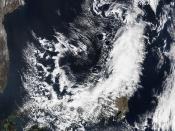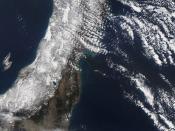The amicable relations between Japan and Korea began souring this past April with the Japanese government's approval of history textbooks, for middle and high school students, which Koreans believe glossed over Japan's past wrong doings. The eight Japanese history textbooks, was adopted this past April, whitewash its wartime atrocities. It distorts history. It ignores the history of women who were forced into sexual slavery and other men and women who were conscripted to work for companies and the Japanese military. Written by nationalistic scholars, the textbooks claim that Japan liberated Asia from Western colonizers in the first half of the 20th century. It is a very self-centered interpretation of history in these textbooks. The eight history textbooks approved in April of this year, by the Japanese government for use in middle schools distort many of the facts on the history of Japanese-Korean relations and Tokyo's war crimes before and during World War II.
Japanese scholars tried to omit or minimize parts of history; it appears to be an attempt to justify Japan's occupation of Asian countries, mostly during the first half of the 20th century. The Fuso book is one of these eight history textbooks that the Japanese government approved in April. Education boards of local governments choose textbooks for public schools in their districts while school presidents make the decision in private and state-run schools.
At least five out of the eight textbooks gloss over accounts of up to 200,000 Korean, Philippine and other Asian women who were forced to provide sexual services for the Japanese Imperial Army in the early part of the 20th century. Whether or not the Japanese government's understanding of the comfort women issue has not changed, writers either omitted or abridged the part based on their own judgment that it is not an...


